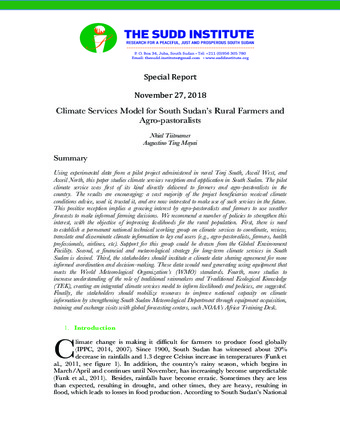Climate Services Model for South Sudan’s Rural Farmers and Agro-pastoralists
Publication Summary
Using experimental data from a pilot project administered in rural Tonj South, Aweil West, and Aweil North, this paper studies climate services reception and application in South Sudan. The pilot climate service was first of its kind directly delivered to farmers and agro-pastoralists in the country. The results are encouraging: a vast majority of the project beneficiaries received climate conditions advice, used it, trusted it, and are now interested to make use of such services in the future. This positive reception implies a growing interest by agro-pastoralists and farmers to use weather forecasts to make informed farming decisions. We recommend a number of policies to strengthen this interest, with the objective of improving livelihoods for the rural population. First, there is need to establish a permanent national technical working group on climate services to coordinate, review, translate and disseminate climate information to key end users (e.g., agro-pastoralists, farmers, health professionals, airlines, etc). Support for this group could be drawn from the Global Environment Facility. Second, a financial and meteorological strategy for long-term climate services in South Sudan is desired. Third, the stakeholders should institute a climate data sharing agreement for more informed coordination and decision-making. These data would need generating using equipment that meets the World Meteorological Organization’s (WMO) standards. Fourth, more studies to increase understanding of the role of traditional rainmakers and Traditional Ecological Knowledge (TEK), creating an integrated climate services model to inform livelihoods and policies, are suggested. Finally, the stakeholders should mobilize resources to improve national capacity on climate information by strengthening South Sudan Meteorological Department through equipment acquisition, training and exchange visits with global forecasting centers, such NOAA’s Africa Training Desk.
Nhial Tiitmamer has served as the Director of the Environment and Natural Resources Program at The Sudd Institute where he is currently on leave to work with United Nations in South Sudan (UNMISS). He has served as an Adjunct Assistant Professor at the University of Juba where he has taught Environmental Economics, Natural Resources Economics and Environmental Sociology. Between November 2021 and November 2022, Nhial worked as Senior Environment Associate with the United Nations High Commissioner for Refugees (UNHCR) in Juba. Before returning from Canada in 2013, Nhial worked at Arletta Environmental Consulting in Calgary and at University of Alberta’s Augustana Campus in Camrose in Alberta, Canada. Nhial’s research focusses on natural resources governance, environmental protection, climate change, and sustainable energy. He was awarded in May 2023 by the Board of Directors of The Sudd Institute with Research Impact Award for policy impacts. Nhial holds a B.A. in Environmental Studies with a minor in English Literature from the University of Alberta and an M.Sc. in Sustainable Energy Development from the University of Calgary in Alberta, Canada.
Augustino Ting Mayai's Biography
Augustino Ting Mayai is the former Managing Director of the Sudd Institute. He is a founding Research Director of the same institution, serving in this capacity for a decade. He holds a Ph.D. in Sociology, with concentrations on demography and development from the University of Wisconsin-Madison. He currently studies how state effectiveness affects child health outcomes in South Sudan and Ethiopia. Dr. Mayai has written extensively on South Sudan’s current affairs. August is the current Chair (Statistician General) of the National Bureau of Statistics, Government of South Sudan.

